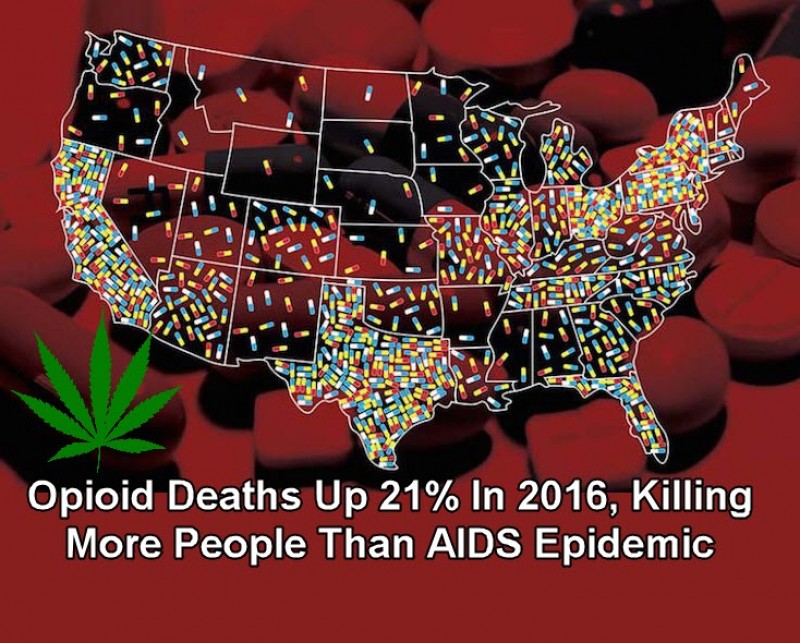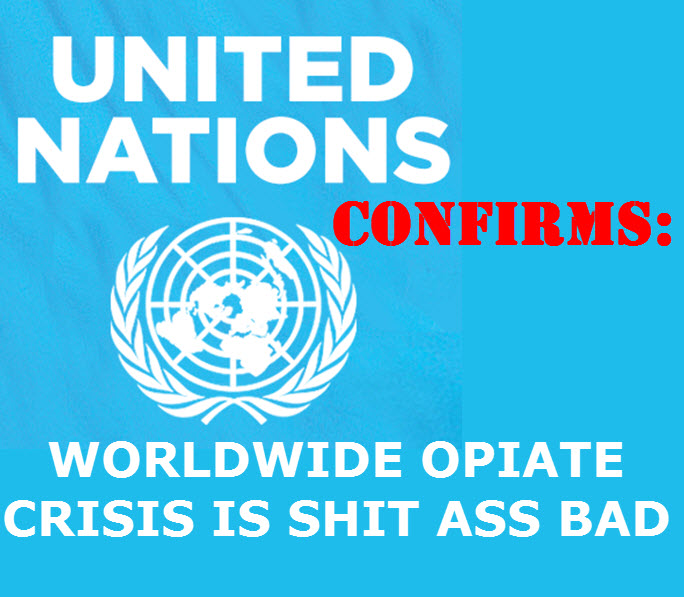Opioid Deaths Up 21% In 2016, Killing More People Than AIDS Epidemic
Opioid Deaths Now Have Killed More People Than AIDS from CannabisNet on Vimeo.
A new report from the Centers of Disease Control and Prevention revealed our worst fears: deaths from opioid overdoses increased 26% in 2016, translating to 63,600 lost lives.
According to an article in the Washington Post, the United States hasn’t experienced two straight years of a reduction in life expectancy since 1962 and 1963, the years when influenza took the lives of many.
“I think we should take it very seriously,” says Bob Anderson, chief of the Mortality Statistics Branch at the CDC’s National Center for Health Statistics. “If you look at the other developed countries in the world, they’re not seeing this kind of thing. Life expectancy is going up.”
The figures show that in 2016, there were over 42,000 Americans who died as a result of opioid overdoses, 28% more than in 2015. What’s worse is that the number of people who died from an overdose on fentanyl as well as other opiates more than doubled to 19,413 last year. Heroin deaths increased 20%, while opiate painkillers such as oxycodone and hydrocodone increased 14%.
Keith Humphreys, Stanford University addiction specialist says, “It’s even worse than it looks.” The official figures may under count the actual opioid deaths by around 20%, and Humphreys says that “we could easily be at 50,000 opioid deaths last year.” He adds, “This means that even if you ignored deaths from all other drugs, the opioid epidemic alone is deadlier than the AIDS epidemic at its peak.”
According to Robert Anderson, who heads the mortality statistics branch of the National Center for Health Statistics, “We’ve gone well beyond the AIDS epidemic now… It’s hard to take in.” He adds that fentanyl accounts for more deaths, saying that “we’re talking about more than an exponential increase.” Even if they only have partial data for 2017, things are still looking grim. “My guess is that when all of the data that are in the 2017 trend line will be at least as steep for 2016, if not steeper,” he says.
Drug mortality has been affecting more people in the 25-54 age group, while overdose rates across all drugs were around 35 for each 100,000 people across all age groups in 2016, a significant increase when looking at the 12 deaths for every 100,000 people below 24 as well as 6 deaths for every 100,000 for seniors aged 65 and up. Drug overdoses were twice as prevalent in men, compared to women.
When looking at the state figures, West Virginia is ground zero for overdose deaths in the United States. West Virginia figures reveal that there were 52 deaths for every 100,000 people last year. New Hampshire and Ohio are the next contenders, which saw 39 deaths for every 100,000 people.
“This is no longer an opioid crisis,” says former Rhode Island congressman Patrick Kennedy, who was also part of Trump’s Commission on Combating Drug Addiction and the Opioid Crisis. “This is a moral crisis…. We know how to answer this problem, but we can’t get around our own prejudices.” According to Kennedy, injectable drugs designed to inhibit opioid cravings are the solution for the opioid crisis although he acknowledges the bias against these forms of treatments saying, “You’re not supposed to take medications – that’s not called sobriety.”
Experts think that political leaders aren’t doing enough to solve the problem and may even make it worse. “The Trump administration’s latest proposed budget cuts the Substance Abuse and Mental Health Services Administration by $400 million,” says Humphreys, “and the tax bill is projected to lead 13 million people to lose health insurance and any coverage for addiction treatment along with it.”
“The Trump administration has failed the country completely in its response to the opioid epidemic,” Humphreys adds.
Just a few months ago, Trump recommended that the opioid crisis should be considered a national emergency. If this moved forward, emergency funding would have been made available to address these problems. Instead, in October Trump declared the public health emergency because of the crisis, a move that didn’t provide additional funding along with it.” Kennedy says that this is taking the lives of 174 people every 8 ½ minutes.
“Right now everybody says it’s happening to somebody else’s family,” says Kennedy. Although if the patterns don’t change, “soon it will be happening to everybody’s family.”
OTHER STORIES YOU MAY ENJOY...
UN CONFIRMS OPIATE CRISIS, READ THIS, CLICK HERE.
OR..
CANNABIS TO GET OFF OPIATES, CLICK HERE.








